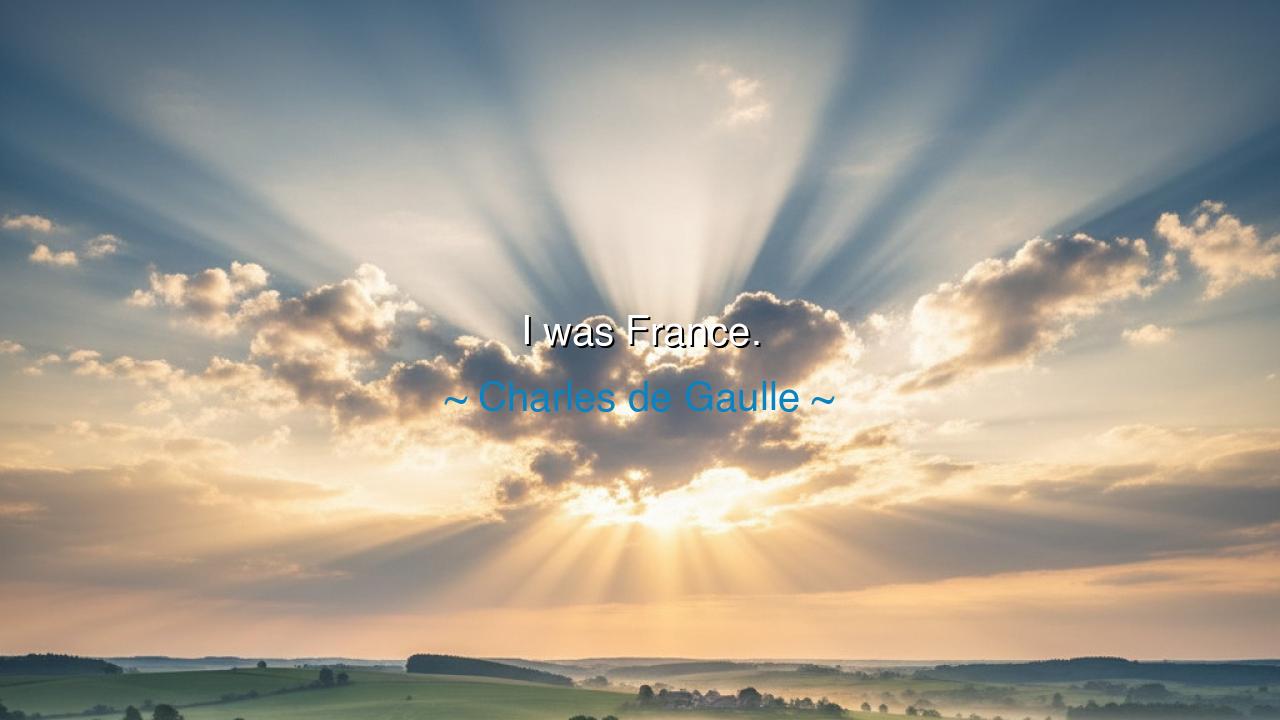
I was France.






“I was France.” With these thunderous words, Charles de Gaulle — soldier, statesman, and savior of his nation — spoke not in arrogance, but in destiny. In this declaration lies the voice of a man who, when his country had fallen silent beneath the shadow of tyranny, became its only heartbeat. To say “I was France” is not to claim ownership of a land, but to declare one’s complete and sacred identification with its spirit — to be the vessel through which a nation’s soul survives when all else has perished.
The origin of this quote reaches back to the dark days of World War II, when in 1940, France — proud and ancient — bowed before the German invasion. Its leaders surrendered, its armies were broken, its people divided. But in that hour of defeat, one man refused to kneel. From exile in London, General de Gaulle spoke to his countrymen through the radio waves, declaring that France had lost a battle, but not the war. In that act, he became more than a general; he became France itself — her conscience, her defiance, her unbroken will. While the government in Vichy collaborated with the enemy, de Gaulle stood alone and proclaimed, “I am France,” because no one else dared to be.
When de Gaulle later said, “I was France,” it was a reflection not of vanity, but of history. He was the living embodiment of national endurance, the guardian of the flame that had not been extinguished. Through the Free French Forces, he carried the tricolor flag across deserts, through battles, and into liberation. When the Allies doubted that France could rise again, de Gaulle’s very presence commanded belief. He refused to let France be seen as conquered — he forced the world to recognize that the soul of a people cannot be occupied. To be France, in his sense, was to hold within himself centuries of honor, courage, and civilization — the collective voice of a wounded but unyielding nation.
There is a story told of the day he returned to Paris in August 1944, after years of exile and struggle. The city, newly freed from Nazi rule, was still echoing with gunfire. The crowds poured into the streets to greet him, their cries rising like a hymn. De Gaulle marched through the heart of Paris — tall, unbowed, his great frame silhouetted against the ruins — while bullets flew and chaos reigned. When aides urged him to take cover, he strode onward, declaring, “France cannot hide.” In that moment, it was as though the spirit of the nation had taken human form. He did not speak for France — he was France.
To understand the depth of this statement, one must see beyond the man into the metaphor he carried. De Gaulle’s words remind us that in every age, when nations or causes falter, a single soul may rise to bear the weight of many. When institutions fail and hope lies buried, it is the individual — steadfast, visionary, defiant — who rekindles the light. Such people are not born for comfort, but for calling. They live not for themselves, but for the destiny they carry. When de Gaulle said, “I was France,” he was saying, “I bore her pain, her pride, her faith, her voice — and through me, she endured.”
But his words are also a warning. For while such identification between leader and nation can inspire greatness, it can also become perilous if pride overtakes purpose. De Gaulle himself walked this line — a man of monumental ego, but also of monumental duty. He understood that to serve one’s country is to become its mirror, not its master. He carried France not to glorify himself, but to restore her to her own reflection. The moment his task was complete, he stepped aside, knowing that nations, like people, must reclaim their own souls.
And so, my children, the lesson of Charles de Gaulle endures: that in times of despair, when all that is sacred seems lost, one must become what one defends. To lead is not to command, but to embody — to let the cause live through one’s breath, to carry the torch through the storm when others have dropped it. You may not be called to save a nation, but you will be called to stand for something greater than yourself. When that moment comes, remember de Gaulle’s words. Let them stir your spirit.
For there will be times when love, truth, or justice itself lies in ruin — and someone must rise to say, not with arrogance but with faith, “I am this cause. Through me, it will live.” Then, and only then, will you understand the meaning of those immortal words: “I was France.”






AAdministratorAdministrator
Welcome, honored guests. Please leave a comment, we will respond soon